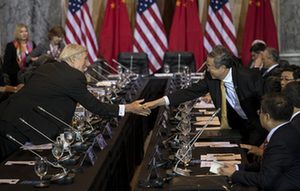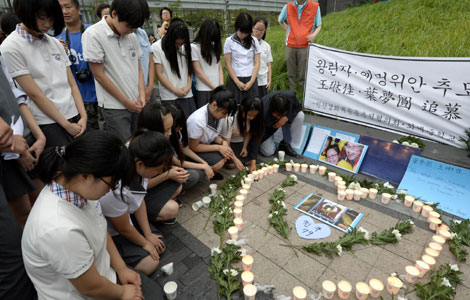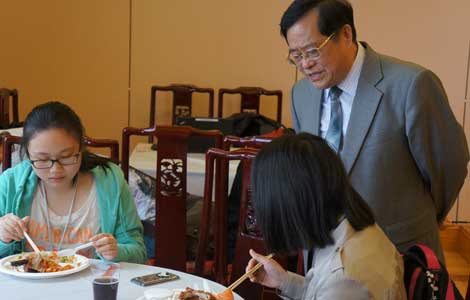Teaching teachers how to teach Chinese, in Texas
Updated: 2013-07-12 12:24
By Caroline Berg in New York (China Daily)
|
||||||||
In Texas, 20 teachers from grades K through 16 schools and colleges are participating in a two-week residential program this month for instruction on teaching Chinese as a second language.
"We want [these teachers] to be well-informed with the most current and up-to-date theories and research on Chinese language acquisition," Xiaohong (Sharon) Wen, lead instructor of the program and director of the Chinese Studies Program at University of Houston (UH), told China Daily.
The 70-hour program at UH is funded by a $92,050 StarTalk grant. StarTalk is a language-learning program established by former US President George W. Bush in 2006 as part of the National Security Language Initiative to expand national capacity in critical languages.
"Due to the lack of qualified teachers in K-16 schools and colleges, instructors in Texas are frequently unable to offer Chinese courses, despite the sustained demand from students and their parents," Manuel Gutierrez, director of the StarTalk Program and professor of Spanish linguistics at UH, said in a press statement.
Texas has the third largest state population of Chinese and Asian residents nationwide, behind California and New York, according to the US Census.
"Although these teachers have experience, they lack theoretically-based and research-based instruction," Wen said. "We impart those parts into their teaching."
The program's coursework will focus on understanding the nature and process of learning Chinese as a second language, identifying crucial issues in Chinese foreign language pedagogy, and enhancing participants' abilities to develop appropriate teaching plans and materials.
The program will include lectures, hands-on activities and collaborative learning. Wen said she invited three professors from other US universities to assist in team teaching.
Participants are expected to develop their ability to become master teachers. Throughout the program, participants develop their own standards-based curriculums to implement when they return to school in the fall.
"We emphasize student-centered classrooms," Wen said. "We consider teachers as facilitators to help create an environment in which students use the language in more authentic contexts and where they negotiate meanings through dialogues and communicative activities."
Each teacher must videotape their work throughout the fall term and participate in two follow-up sessions in October and November to report and evaluate the results of their projects.
"Although this is a Texas-based program, we do recruit [teachers] from other states, so we have people from all different backgrounds and geographic areas," Wen said. This year's program includes three out-of-state teachers.
Among the program's requirements are each teacher must have at least six months of prior professional experience and also have secured a job for the fall term.
This is the second year UH received a StarTalk grant for its Chinese studies program.
"Last year was fabulous," Wen said. "The StarTalk onsite team that came to observe us said they were very surprised because they could not give us any negative evaluation."
In the category of how and what to improve in the program, Wen said the onsite team wrote, "None."
However, the team did have one recommendation: create two or three more programs for the second year. Wen said she didn't do this due to limited human resources and, although she said the grant is very generous, she believes money would also be limited by expanding the program.
"We easily received the grant for this year, but for next year we have to have something different with our program to secure the grant," Wen said. "But I'm very confident we can secure the grant. We're doing very well."
carolineberg@chinadailyusa.com
(China Daily USA 07/12/2013 page10)
Most Viewed
Editor's Picks

|

|

|

|

|

|
Today's Top News
Nokia aims to recapture market
Samsung expands global footprint
China, US explore new investment treaty
Saudi princess charged with US human trafficking
Asiana takes out apology ad in Chinese media
Asia spending too little on poor: report
China, Russia consider increasing naval drills
No mechanical trouble on Asiana
US Weekly

|

|














